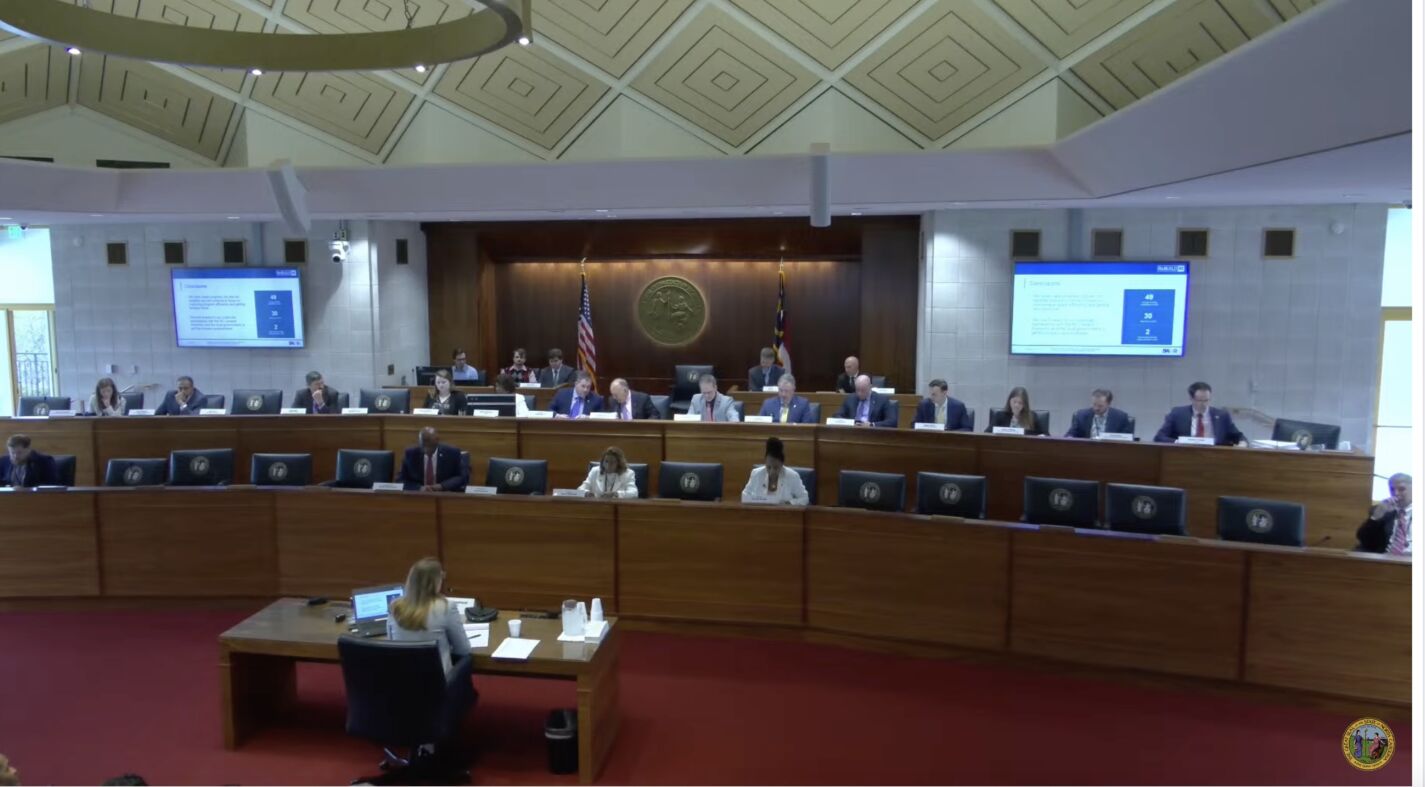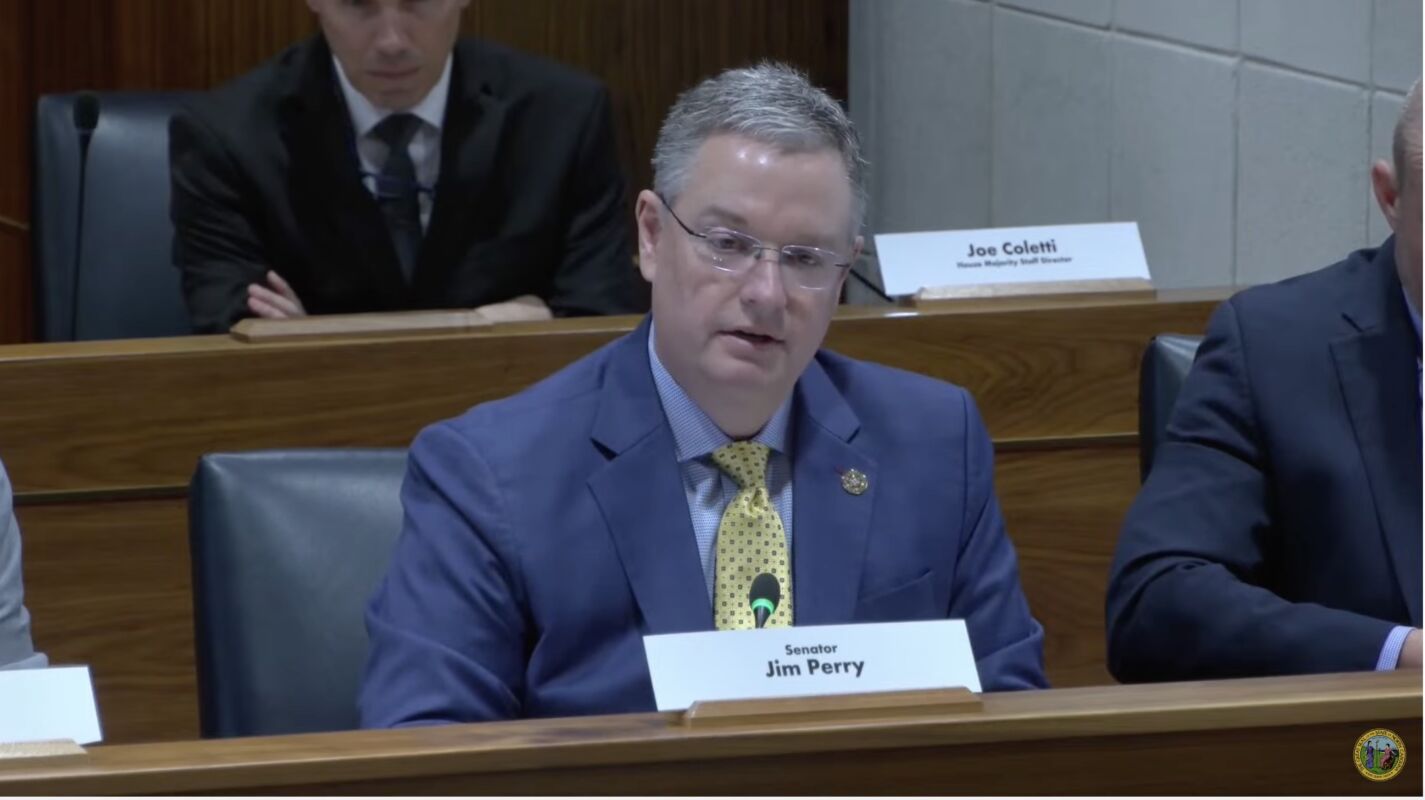It was a case of rinse and repeat for North Carolina lawmakers as they heard much of the same testimony from North Carolina Office of Recovery and Resiliency (NCORR) officials on efforts to help those who lost homes due to Hurricanes Matthew and Florence.
The Joint Legislative Hurricane Response and Recovery Subcommittee questioned NCORR leadership for three-hours at the March 29 hearing about the little progress being made in getting people back into a home after losing everything, for some, as far as 2016, at their third hearing since September.
NCORR Director Laura Hogshead testified that they have gone from completing 5-7 homes a month from figures released at the first hearing to a high of 58 homes in February. Due to weather delays, that number will drop to 38-40 for March. The numbers translate from 789 families in the completed stage in September to 1067 as of Wednesday.
But time is ticking away for the 3,399 families still without homes. The federal government requires that the state spend $778 million by 2025 for Matthew and $ 2026 for Florence.
Hogshead said they have gone from 192 active construction projects in December to 247 as of March 29.
They also have begun working with the St. Bernard Project, a nationwide disaster recovery organization. Lawmakers heard from Col. J.R. Sanderson at the September hearing. He ran the South Carolina Disaster Recovery Program from 2015 to 2019. SBP has given NCORR recommendations like insourcing efforts, which she said has allowed for faster processing of applications.
Hogshead said that taking over case management from HORNE in December and management of Rebuild NC Centers and contact centers from them in January has increased accessibility for applicants through increased center days and hours.
Revision of the general contractors’ scorecard has also increased accountability and prevents, in Hogshead’s words, contractors from “biting off more than they can chew” in terms of taking on too many projects without completion. They now must begin work on 50% of their current projects before taking on new ones.
She also credits Richard Trumper, senior advisor for disaster recovery for the N.C. Department of Public Safety for the addition of more pre-qualified contractors, which has gone from 23 in December to 56, but she notes not all are participating at the moment.
Trumper was appointed to the position in February from his previous position as director of disaster recovery at the North Carolina Office of State Budget and Management to assist Hogshead and her staff.
The program is also utilizing a new assignment threshold of $250,000, up from $30,000, and has increased partnerships with volunteer organizations like Habitat for Humanity.
The questioning began with Sen. Jim Perry, R- Lenoir, who asked why it was taking so long to improve the payment process to contractors, one of which he said had $1.5 in outstanding invoices not paid by NCORR. Perry said that the contractor said if it wasn’t for the slow payments, they could have an additional nine projects started.
While she said she wasn’t sure of the case Perry was referring to, Hogshead said contractors struggle to put all the information on an invoice, and they have established a team to help with the process.
41 of 115 families in homes
Sen. Danny Britt, R-Robeson, told Hogshead that she testified in September that 115 families would be back in their homes before Christmas 2022. He asked her how many actually returned home. She replied 41 families. Britt said that equals out to 4-5 families a month, and at that rate, all of them won’t be back in their homes until June 2025. Hogshead said she disagreed with the number.
Britt also touched upon issues with replacing homes with modular units, including NCORR only awarding a contract to one vendor and rejecting stock plans of houses. Hogshead said she wouldn’t characterize it that way, as they promised specific floorplans to applicants.
He said the Pennsylvania facility currently has four completed homes sitting in their lots since December because the modular vendor hasn’t paid for the last seven modular homes that were delivered. Hogshead didn’t believe that was correct.
“So if they (families) called you today and asked you what’s going on with their home that’s been sitting on a lot for 3.5 months that’s ready to go, but your answer was I can’t specifically tell you why it’s still sitting there, how do you think that would be a satisfying answer to that person sitting in the hotel?” Britt asked.
Hogshead replied, “I’m sure it would not.”
NCORR blames county permitting lags
She also blamed some counties for the lag time in getting permits, saying some of their environmental health departments are understaffed and suggested they use a third-party inspector.
Sen. Steve Jarvis, R-Davidson, said NCORR has a project management issue, not a permitting one.
“It’s disingenuous to blame counties for delays in permits when other contractors in the private sector have it figured out and they can navigate the system,” he said.
Hogshead also hit back that general contractors have to be “pretty brave to work with them right now” as they are under a lot of scrutiny and hope people don’t show up unannounced at job sites or factories asking all sorts of questions because it isn’t a friendly environment right now for contractors.
Rep. Shelly Willingham, D-Edgecombe, said NCORR, the local governments, the Department of Insurance, and all the contractors should meet so everyone can get on the same page to complete the remainder the homes.
Sen. Brent Jackson, R-Sampson, asked Hogshead if they were notifying applicants of the priority process for getting people back into their homes. She said they are working on a process to ensure that people that need the most help are getting it but that the priority list is not transparent to those on it in terms of knowing where they are on it.
Jackson said he was disappointed in her answers.
“How are we as members of this committee, as well as the public, have assurance have some peace of mind that the most vulnerable constituents are going to be taken care of?” he asked her.
Hogshead replied, “You have my word on that, and your staff has been briefed on this.”
Jackson said, “Well nothing personal about what I’m fixing to say, but based off of prior history, your word is not worth a whole lot.”
Trumper testified that his staff is currently composed of him and another person but plans to be an advisory team of five. They are currently seeking outside applicants for different positions.
“just Flat out get to work”
Both Perry and Rep. John Bell, R-Wayne, said Trumper was brought in to streamline the process, not add to the bureaucracy by hiring outside candidates while there are so many others currently on the NCORR staff who could handle those positions. It also adds to people’s wait time to return to a home.
Trumper said it would be a good investment of time and money to hire those individuals to get families home faster.
“My recommendation to you is to go back and look out a private sector works and scrap your org(anizational) chart, pull people over from NCORR, and just flat out get to work,” Bell said.
Perry said temporary housing assistance is approaching $21 million and mentioned that he was glad that William and Geraldine Williams, Greene County, finally had their modular home delivered, but not before the floor plan they were waiting on was built and delivered to other families.
“With them being in the hotel for so long, why would they not have been first in line for that floor plan?” he asked “How did anyone get in front of them?”
Trumper replied that it happened before he started and wasn’t aware of the decision-making process.
Bell also noted that 0 homes had been completed by volunteer organizations like Habitat for Humanity, despite Trumper saying they have good relationships with them and a project in Brunswick County is receiving more attention than harder hit areas of Wayne, Greene, and Lenoir.
Jackson said it was abundantly clear there is still more work to be done, noting they asked Hogshead to make improvements, but the changes she made seemed to be too little, too late.
“At the last hearing, I said I would do everything within my power to help get these families home, and that’s exactly what we intend to do as we move forward,” he said. “Folks, I want you to understand that we will continually meet as long as we need to. We’re not walking off and leaving you. We’re still here.”

